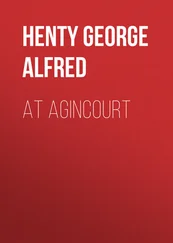“Could you spare Tom, the leader of the archers? I should like to have another Englishman with me, and he is very good-tempered and obliging. He is shrewd too, and with his strength and courage I should feel that I could wholly rely upon him in any strait, though indeed I see not that there is any probability of such occurring.”
“Certainly you can have him, Margaret, and I shall be glad to know that he is with you. Dickon, who is next under him, can act as captain of the archers while he is away. I have noticed that Tom is picking up the language fast. He is always ready to do little kindnesses to the women and children, and I have often heard him talking with them. He will soon get to speak the language fairly. As to the others have you any choice?”
“No, I think you had better choose them for me, Eustace.”
“They had better be French,” he said; “it would not do for you to surround yourself entirely by English, although of course it is natural enough that you should have an English squire and servant. I think that you could not do better than take Jules Varey and Albert Bongarde. They are both stout men-at-arms, prudent fellows, and not given to the wine-cup. As a fourth I would say Jean Picard's son; he is a stout fellow too, and I know that, but for his father's hopes that he will one day succeed him as butler, he would have taken service regularly as a man-at-arms. He fought stoutly when the French gained the wall, and I marked him exchanging blows be in attendance on you; and assuredly Agnes and Charlie will, as well as yourself, benefit by his presence. He will be able to take them out and look after them, and as he talks French as well as English the lad will be useful to you in many ways. Have you any preference as to the four men-at- arms?”
“Could you spare Tom, the leader of the archers? I should like to have another Englishman with me, and he is very good-tempered and obliging. He is shrewd too, and with his strength and courage I should feel that I could wholly rely upon him in any strait, though indeed I see not that there is any probability of such occurring.”
“Certainly you can have him, Margaret, and I shall be glad to know that he is with you. Dickon, who is next under him, can act as captain of the archers while he is away. I have noticed that Tom is picking up the language fast. He is always ready to do little kindnesses to the women and children, and I have often heard him talking with them. He will soon get to speak the language fairly. As to the others have you any choice?”
“No, I think you had better choose them for me, Eustace.”
“They had better be French,” he said; “it would not do for you to surround yourself entirely by English, although of course it is natural enough that you should have an English squire and servant. I think that you could not do better than take Jules Varey and Albert Bongarde. They are both stout men-at-arms, prudent fellows, and not given to the wine-cup. As a fourth I would say Jean Picard's son; he is a stout fellow too, and I know that, but for his father's hopes that he will one day succeed him as butler, he would have taken service regularly as a man-at-arms. He fought stoutly when the French gained the wall, and I marked him exchanging blows with Sir Clugnet himself, and bearing himself as well as any man there.' You could choose no better.”
“So be it,” she said. “I think, Eustace, that with four such defenders, to say nothing of young Guy, you need not feel uneasy about us.”
“I don't think that I shall feel uneasy, Margaret; but I know that I can ill spare you. You have ever been at my side since we were married, save when, after the birth of Agnes and Charles, you were forced to stay in England when I came over here. I felt it a dreary time then, and shall feel it so now; but I doubt not that all will go well with you, though it will be a very different life to that to which you have been accustomed.”
“I shall do well enough,” Margaret said cheerfully, “and maybe I shall get so fond of court that you will have to take me to that of Henry when we return to England.”
“Now you had best begin to make your preparations. I will speak to Guy and the others myself.”
Sir Eustace went into the court-yard, where Guy was superintending the issue of provisions for the women.
“This can go on without you,” he said; “Gervaise will see to it. I would speak to you. You were at the meeting this morning, Guy, and you heard what the herald of France said. The position is a hard one. I cannot hold the castle against the strength of France, while if we take a Burgundian garrison I should cease to be its master, and it would doubtless soon pass into other hands. Again, if I go to England, it would equally be lost to us. Therefore my wife has resolved, in order to gain time until these disorders are over, to go to Paris with the children as a hostage for me. In no case, as it seems to me, are Dame Margaret and the children likely to be in danger; nevertheless, I am greatly loth for them to go. However, seeing no other way out of the business, I have consented, and we have arranged that you shall accompany her. You will go as my esquire, and I shall install you as such this afternoon. You will take Long Tom, two of the men-at-arms, and Robert Picard, all good men and true; but at the same time the burden and responsibility must rest upon your shoulders. You are young yet for so grave a charge, and yet I feel that I can confide it to you. You will have to be the stay and support of your mistress, you will have to be the companion and friend of my children, and I shall charge the four men-at-arms to take orders from you as from me. Tom will be a valuable fellow. In the first place, he is, I know, much attached to you, besides being shrewd, and a very giant in strength. The other three are all honest varlets, and you can rely upon them in any pinch.”
“I will do my best, my lord,” Guy said quietly; “and I am grateful to you indeed for the confidence that you show in me, and I shall, I hope, prove worthy of it, and of my father.”
The news soon spread through the castle that Dame Margaret was going to Paris. The maids wept at the thought, as did many of the tenants' wives, for since the siege began, her kindness and the pains that she had taken to make them comfortable had endeared her greatly to them. On her previous visits they had seen comparatively little of her; she had been to them simply their lord's English wife, now they knew her as a friend. Nevertheless, their regret at her leaving was softened by the thought that her going to be near the king insured peace for them, and that they would now be able to venture out to the houses that were fast rising on the ruins of their former homes, and to take up their life again as they had left it.
Early next morning the little cortege mustered in the court-yard in readiness for a start. Sir Eustace and his wife had said good-bye to each other in their chamber, and she looked calm and tranquil as she mounted her horse; for, having been accustomed from a child to ride with her father hunting and hawking, she could sit a horse well, and scorned to ride, as did so many ladies, on a pillion. Guy rode by her side, with Agnes on a pillion behind him. Long Tom, with Charlie perched in front of him, followed them, and the three men-at-arms brought up the rear. Charlie was in high spirits; he regarded the trip as a sort of holiday, and had been talking, ever since he got up, of the wonders that he should see in Paris. Agnes better understood the situation, and nothing but the feeling that she ought to emulate the calmness of her mother restrained her from bursting into tears when her father lifted her on to her seat. The herald led the way, followed by his two pursuivants. Dame Margaret checked her horse in the middle of the court-yard, and said in a loud clear voice to the tenants and men-at-arms round: “Adieu, good friends; I trust that I shall not be long away from you. I go to stay for a time at the court in Paris, and I leave you with the surety that you will have peace and rest until I return, and be able to repair the damages you suffered from the attack made upon us by men who regard not the law.” She turned and waved her hand to Sir Eustace, who was standing immovable on the steps, and then, touching the horse with her heel, they moved on after the herald.
Читать дальше












